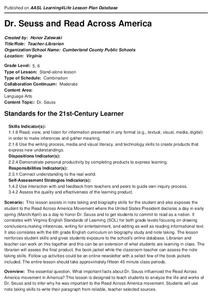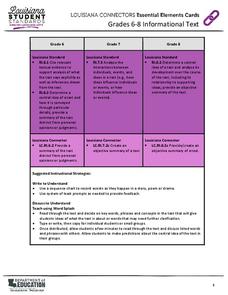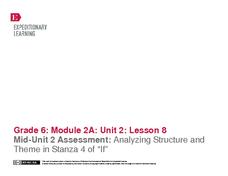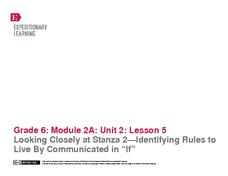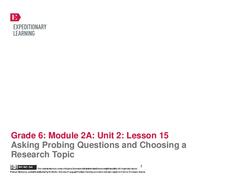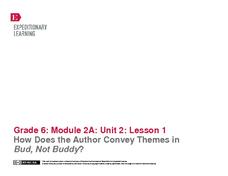Novelinks
Zach’s Lie: Questioning Strategy – Cubing
Your class won't be a bunch of squares from using this well-rounded activity! Instead, they'll be expressing thoughtful questions using the cubing strategy. The class brainstorms questions of increasing rigor about Zach's Lie in the...
Illinois State Board of Education
Common Core Teaching and Learning Strategies
Here's a resource that deserves a place in your curriculum library, whether or not your school has adopted the Common Core. Designed for middle and high school language arts classes, the packet is packed with teaching tips, materials,...
Curated OER
Dr. Seuss and Read Across America
What important facts about Dr. Seuss influenced the Read Across America movement...? This is the driving question of a research project that requires scholars to find information about Dr. Seuss' life and work. Class members write a...
EngageNY
Notices, Wonders, and Vocabulary of the Third Stanza of “If”
How does one's experience reading a poem's text differ from listening to its audio version? Delve into the insightful question with the poem, If by Rudyard Kipling, as pupils compare and contrast their experience using a note-taking...
Louisiana Department of Education
Essential Elements Cards
Use essential elements cards to help lesson plan! Each card contains an informational text common core standard for grade levels six through eight and suggestions for activities and supports. Cards address skills such as citing textual...
Novelinks
The Little Prince: Brainstorming Activity
What do you think of when you hear the word adult? Or friend? Learners brainstorm with a group of peers to list the words they think of when they hear seven words from Antoine de Saint-Exupéry's The Little Prince.
Novelinks
Count of Monte Cristo: Questioning Strategy – Tossed Terms
Do you know the setting of The Count of Monte Cristo? What about the main characters? Explore the elements of Alexandre Dumas' novel with a reading comprehension activity. Kids toss boxes with literary elements written on each side, and...
Novelinks
The Little Prince: Biopoem Strategy
Learn about character traits with a biopoem activity. Based on Antoine de Saint-Exupéry's The Little Prince, the activity prompts learners to fill in the blanks of a poem form to describe themselves.
EngageNY
Introducing “If” and Noting Notices and Wonders of the First Stanza
After reading chapter 14 of the story Bud, Not Buddy by Christopher Paul Curtis, scholars take part in a read-aloud of the poem If by Rudyard Kipling and compare it to the reading of Bud, Not Buddy. Learners then go deeper into the poem...
EngageNY
Notices and Wonders of the Second Stanza of “If”
Here is an instructional activity that asks pupils to analyze poetry and sparks discussion about two different types of texts: asking how is the poem, If by Rudyard Kipling alike and different from the story, Bud, Not Buddy by...
EngageNY
Analyzing Structure and Theme in Stanza 4 of “If”
Here is a lesson that provides scholars with two opportunities to stretch their compare-and-contrast muscles. First, learners compare and contrast their experience reading the fourth stanza of If by Rudyard Kipling to listening to the...
EngageNY
Looking Closely at Stanza 1—Identifying Rules to Live By Communicated in “If”
Here is a lesson plan in which pupils connect themes and rules to live by from the story Bud, Not Buddy by Christopher Paul Curtis to those found in the poem If by Rudyard Kipling. First, scholars discuss their reading and review Bud's...
EngageNY
Looking Closely at Stanza 2—Identifying Rules to Live By Communicated in “If”
Pupils take part in a close reading of the poem, If by Rudyard Kipling, in which they delve deep into its meaning and identify its rules to live by. As the grand discussion progresses, learners then relate the poem's rules with those...
EngageNY
Asking Probing Questions and Choosing a Research Topic
Begin the writing journey of an evidence-based essay detailing a rule to live by with various activities to familiarize learners with the topic and jump-start brainstorming. First, pupils take part in an in-depth review and discussion of...
EngageNY
Qualities of a Strong Literary Argument Essay
One activity, two essays, and one central theme: qualities of an argument essay. Here, scholars first describe the qualities of an argument essay regarding Bud's rules to live by from the novel Bud, Not Buddy by Christopher Paul Curtis....
EngageNY
How Does the Author Convey Themes in Bud, Not Buddy?
After reading up to chapter 12 of Bud, Not Buddy by Christopher Paul Curtis, scholars read chapter 13 and take part in a grand conversation about the author's writing techniques. Pupils discuss how his writing conveyed literary themes...
Museum of Tolerance
Family Tree Activity
Discover the family histories that make the classroom with a family tree activity. Scholars locate information about their family, construct a family tree, and work together to tally where family members are born.
Weebly
Author Study: Eric Carle
Dive into an author study of one of the most beloved children’s book authors, Eric Carle. After reading some of his stories, including Papa Get me the Moon, A House for Hermit Crab, The Grouchy Ladybug, and The Very Busy Spider, readers...
EngageNY
Introducing Research Folders and Generating a Research Question
Take the next step in the writing process with a lesson plan geared towards the completion of writing an evidence-based essay about a rule to live by, as Bud did in Bud, Not Buddy by Christopher Paul Curtis. Pupils collaborate with their...
EngageNY
Pitching Your Claim with Best Evidence
Does Bud use his rules to survive or thrive? That is the driving question of a lesson plan following the reading of Bud, Not Buddy by Christopher Paul Curtis. In an argument essay prewriting activity, pupils use textual evidence to...
EngageNY
End of Unit 2 Assessment: Final Draft of Literary Argument Essay
Take the last step in writing a literary argument essay using Bud, Not Buddy by Christopher Paul Curtis in an activity focused on feedback. Using the stars and steps revision method, pupils consider teacher and peer feedback to revise...
Roald Dahl
Matilda - The Platinum-Blond Man
Before reading Chapter Six, "The Platinum-Blond Man" in Matilda, readers preview the illustration of Mrs. Wormwood dropping her plate of food, and think about what may have happened to cause the scene. After reading the chapter, class...
Crafting Freedom
Creating Original Historical Fiction Using Henry "Box" Brown's Narrative and Runaway Slave Ads
Young historians discover the experiences of runaway slaves after reading the brief biography and narrative excerpt of Henry "Box" Brown, who escaped slavery by having himself shipped away in a crate and popularized his flight in a...
Crafting Freedom
F.E.W. Harper: Uplifted from the Shadows
Young historians discover the life of an incredible African American woman who, as an anti-slavery lecturer prior to the Civil War, defied stereotypes of what women could accomplish. Pupils explore the concept of stereotyping, read...




